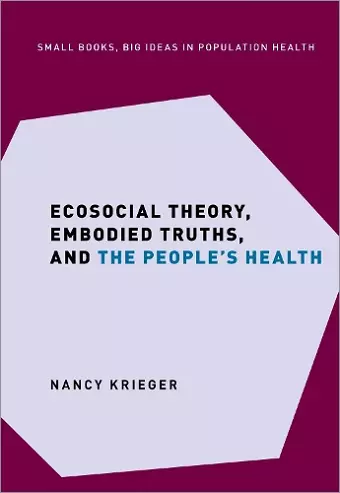Ecosocial Theory, Embodied Truths, and the People's Health
Format:Hardback
Publisher:Oxford University Press Inc
Published:9th Nov '21
Should be back in stock very soon

From public health luminary Nancy Krieger comes a revolutionary way of addressing health justice and the embodied truths of lived experience. Since the 1700s, fierce debates in medicine and public health have centered around whether sources of ill health can be attributed to either the individual or the surrounding body politic. But what if instead health researchers measure--and policies address--how people biologically embody their societal and ecological context? Ecosocial Theory, Embodied Truths, and the People's Health represents a daring new foray into analyzing how population patterns of health reveal the intersections of lived experience and biology in historical context. Expanding on Nancy Krieger's original ecosocial theory of disease distribution, this volume lays new theoretical groundwork about embodiment and health justice through concrete and novel examples involving pathways such as workplace discrimination, relationship abuse, Jim Crow, police violence, pesticides, fracking, green space, and climate change. It offers a crucial counterargument to dominant biomedical and public health narratives attributing causality to either innate biology or decontextualized health behaviors and provides a key step forward towards understanding and addressing the structural drivers of health inequities and health justice. Bridging insights from politics, history, sociology, ecology, biology, and public health, Ecosocial Theory, Embodied Truths, and the People's Health presents a bold new framework to transform biomedical and population health thinking, practice, and policies and to advance health equity across a deeply threatened planet.
A tour de force, Nancy Krieger's latest book weaves together decades of her own pioneering work integrating ecosocial theory, empirical research, and transformative policy and politics. This clear-headed cri de coeur is guided by Krieger's dazzling intellect, deep historical and contextual understanding, methodological knowhow, and above all is motivated by her lifetime of commitment to social and health justice. * Anne-Emanuelle Birn, Global Development Studies, University of Toronto *
In this landmark book, Nancy Krieger makes a compelling case for not simply working to address health inequities but grounding that work firmly in ecosocial theory and a deep understanding of the 'embodied truths our bodies tell.' A masterpiece, from one of the most important public health scholars of the last half century. * Meredith Minkler, School of Public Health, University of California, Berkeley, and co-editor, Community Organizing and Community Building for Health and Social Equity *
Building on decades of research, Nancy Krieger's eloquent writing takes us on a journey through history, science, and sociology to peel back surface explanations and reveal what truly shapes our health. This exposé of how our bodies reflect the embodied truths of society should be required reading for anyone seeking to understand health disparities. * Steven Woolf, Center on Society and Health, Virginia Commonwealth University *
This book connects all the dots—structural racism, class, power, gender, white supremacist culture, policy, ableism, and more—providing the most elegant and accessible explanation of how they all interact, connect, and shape not only embodied health but our environment and public policy. The stories, the data, and the analysis are deftly on point. This book is an absolute game changer. * Makani Themba, Higher Ground Change Strategies, Jackson, Mississippi *
This book provides a clear, accessible entry into one of Nancy Krieger's main contributions to public health literature—the ecosocial theory of disease distribution—with helpful examples for the application and importance of this theory for a general audience. Many communities of color will resonate with her explanation of the interdependence of societal and environmental situations on unequal and disparate health outcomes. * Randall Akee, Departments of Public Policy and American Indian Studies, and Chair of American Indian Studies Interdepartmental Program, University of California, Los Angeles *
Nancy Krieger's groundbreaking concept of ecosocial theory has influenced a generation of environmental and public health scholars. Her expanded framework on discovering truths explores how diverse points of pollution, social stratification, and poverty intersect through the human body. This is a must-read for anyone seeking to advance environmental and racial justice in the public health field. * Michael Méndez, School of Social Ecology, Department of Urban Planning and Public Policy, University of California, Irvine and author, Climate Change from the Streets: How Conflict and Collaboration Strengthen the Environmental Justice Movement *
Nancy Krieger's conceptual thinking has been pushing the boundaries of epidemiological theory for decades now. This 'small book' will rapidly become essential reading for all those who use epidemiology to tackle the multiple dimensions of inequality affecting our societies. * Cesar Victora, International Center for Equity in Health, Universidade Federal de Pelotas, Brazil *
ISBN: 9780197510728
Dimensions: 124mm x 170mm x 25mm
Weight: 386g
352 pages